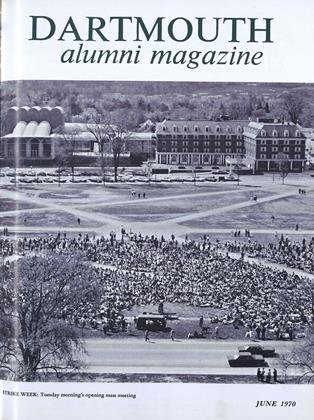"Strike Back" was organized in reaction to the suspension of classes that followed President Kemeny's speech on Monday night. This apprehension was increased by the lack of any concrete date for the resumption of normal academic activities and by calls for an indefinite strike made at the mass meeting held Tuesday morning.
Tuesday and Wednesday mornings found us searching for some way to register disagreement with the official suspension of normal activities, and for some way to gain resumption of classes. Some students began to investigate possible legal action while others sought support from their parents and friends among the alumni. Gradually the individuals who opposed the shutdown learned of the existence of others with similar ideas, and so six students were sent to President Kemeny to request office space, the use of a telephone, and printing privileges similar to those granted the striking students.
The first meeting of the Strike Back Committee was attended by 18 students who resisted the suspension of normal activities. What commonly seemed to be at issue was not the political precepts that triggered the mobilization that came to be known as the Strike, but the concern felt by a substantial minority that our educational rights and opportunities would be jeopardized by any activity that would close the institution. As such, the Strike Back Committee assumed a non-political position on the strike issues, calling for an immediate resumption of normal academic processes for those who wished to take part in them.
Wednesday evening three representatives of Strike Back were sent to the meeting of the New Hampshire Alumni Association in Concord to distrbute a statement similar to the one which was printed in the Alumni Bulletin and to discuss the strike informally with many of the people present. The speeches by Bill Koenig and President Kemeny hardly encouraged Strike Back to hope for an early resumption of classes.
While these members were in Concord other Committee members printed and distributed a statement to every dormitory room on campus. Announcements of the committee's formation were made over WDCR, and community and student response was almost immediate. Work continued around the clock, and by Thursday morning when announcements were made to the press, student membership had increased to over forty. As word spread, Strike Back began to receive calls from alumni supporting our efforts to reopen classes.
By Thursday afternoon over 250 signatures had been obtained on a petition calling for an immediate resumption of classes for those who wished to attend, and Strike Back had received invitations to speak at several local schools, as well as requests for interviews over WMUR-TV in Manchester, WNHV in White River Junction, and WDCR, the Dartmouth radio station. Late in the afternoon the Committee on Organization and Policy (COP) invited Strike Back to send a representative to join in discussing possible compromises that would allow both continued political activities and a resumption of classes. After considerable discussion the COP passed a recommendation which was to become the faculty solution to the problem of students' rights to classes.
Thursday night President Kemeny again addressed the College over WDCR endorsing the COP proposal. Shortly afterward Strike Back endorsed the COP proposal, recognizing a policy that would effectively allow us the political neutrality we desired and at the same time afford us the continuation of classes we had worked for. We believed this proposal was comprehensive enough to protect the interests of the entire student body, thus fulfilling the qualifications set by both the Strike and Strike Back Committees.
Since the adoption of the COP plan, the Strike Back Committee has continued to carry out speaking engagements and to answer correspondence. Some students from the Committee have taken advantage of the optional provisions of the plan to work in political campaigns at home, or to speak for President Nixon's policies in the Hanover area. Others returned to classes and tried to make up for lost time and complete their regular work for the term.
Strike Back leaders set up their ownoffice and created a thumbs-up posterto indicate their point of view.
 View Full Issue
View Full Issue
More From This Issue
-
 Feature
FeatureFor Want of a Better Word They Called It a Strike
June 1970 By DAVID MASSELLI '70 and WINTHROP ROCKWELL '70 -
 Feature
FeatureSix Professors Reach Retirement
June 1970 -
 Feature
FeatureNew Environmental Studies Program To Be Launched in the Fall
June 1970 By ROBERT B. GRAHAM '40 -
 Feature
FeatureThe Class Officers Weekend
June 1970 -
 Article
ArticlePRESIDENT KEMENY'S RADIO TALK
June 1970 -
 Article
ArticleWhat the Workshops Meant
June 1970 By GUY DE MALLAC-SAUZIER







